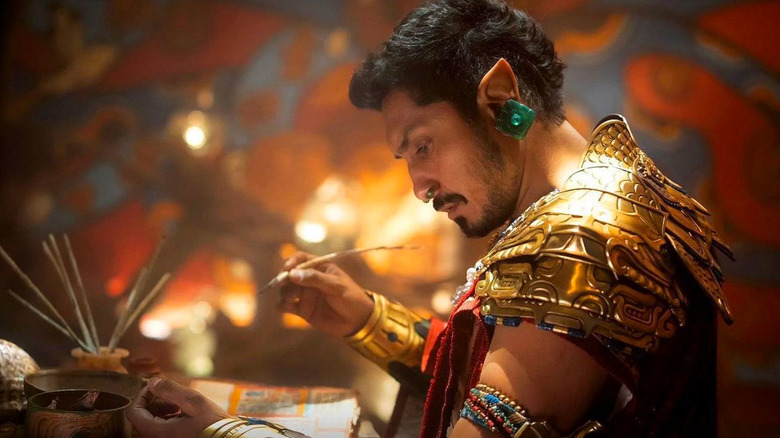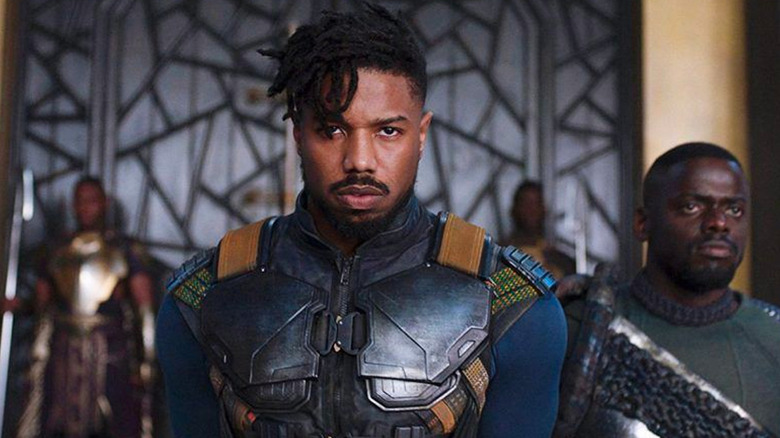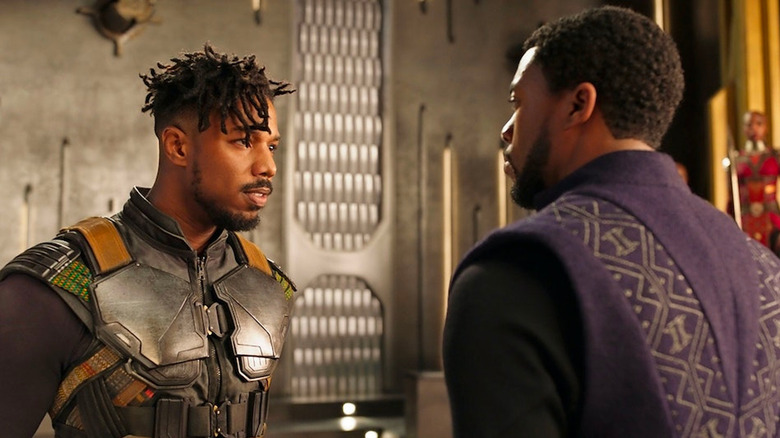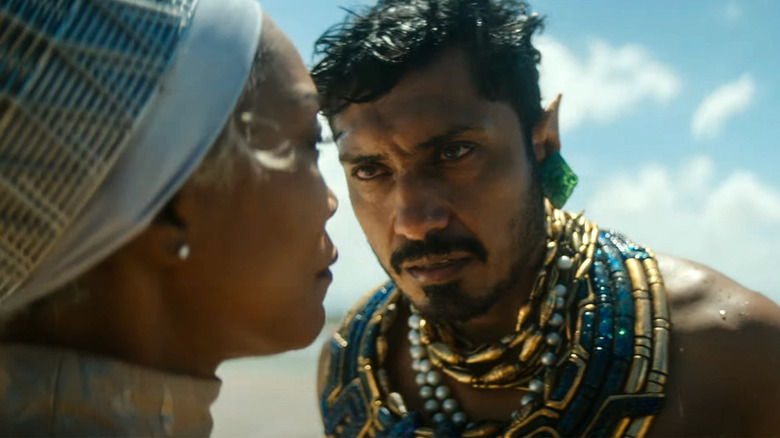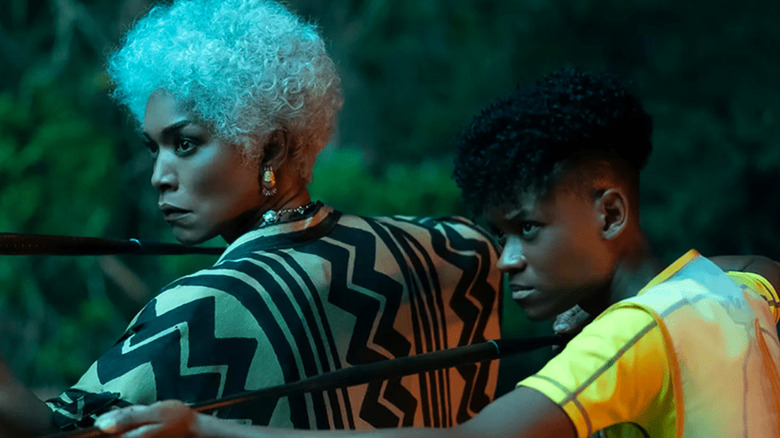The Black Panther Films Do Have A Villain — Just Not The Kind You Think
"Black Panther: Wakanda Forever" director Ryan Coogler doesn't see his villains as villains at all, even if characters like Erik Killmonger (Michael B. Jordan) and Namor (Tenoch Huerta Mejía) definitely make things difficult for the good guys in the Marvel Cinematic Universe. Serious conflict — and all-out war — manifests between these characters and the Black Panther, whether it be King T'Challa (the late Chadwick Boseman) in Coogler's first film or Princess Shuri (Letitia Wright) in "Wakanda Forever." But in building out the conflict between good and evil, Coogler prefers to take a more empathetic approach.
"I don't see them as villains," Coogler recently told Collider. "I think about them as, you know, this is a character that's going to come in conflict with my protagonist. It'd be interesting if they want the same things, but because of who they are, and what shaped them, they want to get those things in different ways and their means come in conflict with each other."
After Coogler's comments, it'd be easy to deduce that the "Black Panther" films are without villains altogether, but that wouldn't be accurate either. It's been said that the true villain of the films isn't something you can easily put your hand to, much less physically fight. It's the specter of colonialism, and though it does have a hand in shaping Coogler's antagonists into who they eventually become, it largely manifests in Wakanda's cool conflicts with the Western world. It's a pretty inspired choice, making the "Black Panther" duology among the few Marvel films that have acknowledged the effects of white supremacy. But like so many things in the MCU, it only works until it doesn't.
The blueprint
"Black Panther" wasn't the first MCU film to pit its hero against a sympathetic antagonist, but it certainly felt like the one that cemented that dynamic with the most success. Killmonger represents a perfect foil to T'Challa in every way: he's a son of Wakanda with a viable right to the throne, despite having been born in America. But his father N'Jobu (Sterling K. Brown) betrays Wakanda in order to aid oppressed peoples across the African diaspora, which leads to his death — by the hand of his own brother — and leaves Killmonger to fend for himself.
Killmonger is, as T'Challa puts it, a monster of Wakanda's own making; his role in "Black Panther" is not an easy one to digest. It's incredibly layered, endlessly complex, and until the last moment, it seems determined to hold everyone accountable for their stake in the issue at large. In Killmonger, T'Challa sees every mistake that Wakanda has ever made. In facing him, T'Challa is forced to confront the sins of his forefathers — to admit that they were hypocrites, complicit in the subjugation of their neighbors in the continent and the world over. They're two halves of one coin in that they agree on what has to be done, but not on the way to move forward. T'Challa refuses to fund a world war, even if it means helping to liberate those under the yoke of white supremacy. This makes him an enemy, and it makes Wakanda the first nation that has to fall for Killmonger to get what he wants. As a result, "Black Panther" has to take him off the board.
Who's side are we on?
It's hard to revisit "Black Panther" in a world that has grown increasingly fed up with white supremacy. So much has happened since our first fateful encounter with Wakanda. The topic of reparations has been circulating all over the world of late; the Black Lives Matter movement and efforts to defund the police have become new priorities for Black Americans. Killmonger's motivations and sentiments already had some merit back in 2018. Four years later, circumstances feel more dire than ever — and Killmonger feels even more justified.
Of course, that's not to say that he was justified in his scorched earth approach. Coogler's films have consistently explored the theme that the fire you're forged in has a direct influence on the way a person navigates the world, handles conflict, and ultimately handles enemies. Killmonger's approach to the fight was morally wrong — but were T'challa's efforts enough to inspire real change?
It's this question that fuels the premise for "Wakanda Forever." Ever since T'challa revealed Wakanda to the world at the end of "Black Panther," the nation has been locked in a cold war with others that are desperate for a taste of vibranium. This threatens to expose the underwater empire of Talokan — the only other place on earth where the metal has been found — and it drives its king, Namor right to Wakanda's doorstep.
Enter Namor
In Namor, "Wakanda Forever" finds another avenue through which to address the issue of colonialism. Like in "Black Panther," Ryan Coogler and Joe Robert Cole do the work to bring Namor's plight into perspective. We spend time with him and with his people so that we understand exactly what he's fighting for. Namor has witnessed what colonialism has done to his ancestors firsthand, and he's determined to keep his people from that same fate.
Just like with Killmonger, Namor's solution is to strike back at the surface world, to prevent history from repeating itself. But he can't do that without Wakanda's help, given that any outright attack would expose Talokan once and for all. And just like T'challa before her, Shuri cannot justify a war on the world stage — nor will she allow Namor to kill the scientist whose invention nearly exposed Talokan in the first place. That makes Namor the irrepressible force to Shuri's immovable object, and it leads to yet another internal skirmish that completely takes the attention away from the issues that matter.
Wakanda and Talokan are only at odds because the narrative refuses to address the very real villain in the room. Again, it's the greed of the West, and those countries' need to destabilize any nation with the raw resources they covet. This truth is sprinkled sparingly throughout the sequel, particularly when Queen Ramonda (Angela Bassett) confronts the US and France at the United Nations assembly. Namor's own origin in the MCU is also intrinsically tied to Spanish colonization in Mexico. "Wakanda Forever" comes close to framing these atrocities for what they are, but Namor's own crimes — and Wakanda's efforts to protect the world from him — consistently distract from the issue.
More of the same
In the end, "Wakanda Forever" boils down to the same tired conflict as its predecessor. Instead of these two nations working together to (peacefully) combat the effects of white supremacy, they're pitted against one another in the final hour. Not only do the true antagonists get off scot-free, but their scheme to plunder Wakanda will likely rear its head in another MCU project very soon. It's not hard to see what the universe is ramping up to, but there's no reason to hinder the story that was naturally building in "Wakanda Forever."
Naturally, I can understand why the 38th installment of what is essentially one big propaganda machine cannot condone a conflict with a western nation. But war is not the only way to call said nations out on their BS: "Black Panther" proved that to some extent. The high road approach can work, but not without holding every player accountable in the end. You can stop Namor, but you must also address the systems of oppression that created Namor. If you don't, it will just set the stage for another antagonist with similar motives down the line, and another near identical conflict.
It's great that the "Black Panther" films succeed so well in creating antagonists with nuance, and a conflict so compelling that we're not sure who to root for. It just sucks that, after building to the general consensus that colonialism is bad — and that said colonialism is still going on unchecked! — "Wakanda Forever" can't drive that point home in the way that it deserves.
